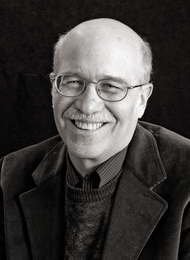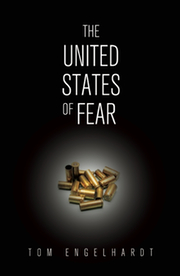Tom Engelhardt is a prolific writer and editor, and the curator of TomDispatch, a popular website that presents political commentary. I put six questions to him about his new book, The United States of Fear, in which he projects a fairly gloomy near-term future for an America pulling back from Empire:
1. You write about your deep experience with the cinema during your childhood in New York, and how it helped shape your outlook on the world. Compare your experience with that of an adolescent today. Are Hollywood and its foreign competitors doing a good job of preparing us to face the challenges of coming generations in a rational way?

I would never claim my childhood was anything but unique where movies are concerned. I lived on a street in New York City in the 1950s that had three theaters dedicated to what were then called “foreign films”—at a time when you could travel hundreds of miles across this country without stumbling across such a film. And I had an RKO theater as well, so I could catch war, American-style, and then, as a teenager, consort with “the enemy”—present and former—in Russian, Italian, Japanese, and German films. It was an eye-opening experience that certainly helped make me who I am. But it wasn’t common then and it certainly isn’t common now.
I mean, I’m writing this in a week when the number-one film at the box office in the United States, Act of Valor, is an action thriller made by (and for) U.S. special operations forces. And the truth is that even in antiwar films out of Hollywood, Americans still hog center stage (otherwise, assumedly, no one would turn out).
So Hollywood, “rational”? Hmmm. Preparing us for the challenges of the future? You bet: though in war terms, not exactly the future you and I might have in mind. Today you need to talk about the many screens of childhood on which you can be a Navy Seal or the like, weapons in hand, blowing away the enemy. Of course, to be fair, I went to the park and did something similar with sticks, shooting down hordes of Japanese, Germans, and Commies. Plus ça change…
2. In diagnosing the “National Security Complex,” you suggest that America’s democratic institutions are under a quiet but steady assault. What do you mean by this concept, and where do you think it’s taking us?
In my book, I say that we are now in a “post-legal America” when it comes to the National Security Complex. What that means is simple enough. The U.S. legal system, which still applies to you and me, really no longer applies to the national-security state. What the last decade-plus should have taught anyone working in that world is: no matter how extreme or potentially illegal your actions may be, American justice no longer applies to you. You will never be brought before a court of law, whatever you do. Torture, illegal surveillance, kidnapping terror suspects off the streets of global cities and rendering them to torturing regimes—it really doesn’t matter. It’s as if the mother ship of the national-security complex had simply lifted off from American earth and was now beyond our control. Thought of another way, only one prosecutable crime exists today—under the Espionage Act, no less—for anyone in the complex: whistleblowing. In other words: do what you want, just don’t tell Americans what goes on in these precincts or we’ll take you down.
In addition, the president and his top officials can now decide to do whatever they think needs to be done, call in the lawyers, prepare the necessary documents, and call it legal. An example: the assassination by drone of an American citizen and terrorist suspect in Yemen. (The Bush administration acted similarly, calling in lawyers from the Department of Justice to make torture “legal.”) In other words, we’re regularly making new law, outside either Congress or a court of law.
3. America has now had two consecutive national elections while two wars were raging overseas, without war figuring as an important election issue in either. Does this say something about the quality of American democracy?
This says something about the way in which the American public has been detached from our perpetual war-making. The crucial moment here occurred almost four decades ago when President Nixon officially ended the draft Army, essentially severing citizens in a distinctly rebellious mood from military service.
Think of it as a pacification campaign that worked. The citizenry was demobilized and left to go about its business without any obligation to Washington’s war-making. A fully professionalized all-volunteer military, increasingly separated from (if also deified by) American society, paved the way for many things: first came professional war, then privatized war, then mercenary and outsourced war—the arrival of what I call the “warrior corporation.” (In Afghanistan, there are now more private contractors dying than troops.)
Americans are almost startlingly remote from our present wars, which go on without us (if you leave aside the tiny percentage of Americans who fight, or who are family members of those fighting). Perhaps this is why drone warfare, which couldn’t be more literally “remote” from us or make us more remote from war, seems, according to the latest poll I’ve seen, so soaringly popular here.
4. American reporting on the wars in Iraq and Afghanistan has focused on deaths and casualties suffered by Americans in uniform, to the exclusion of local civilians and even American contractors. How has this fact affected our understanding of the war effort?
It has meant, in essence, that we don’t have to notice what we’ve actually been doing out there in the world since September 2001, which is filling up countless “towers” with dead and wounded Iraqis, Afghans, Pakistanis, and so on. I’m always surprised at how little attention any of this gets here.
My website, TomDispatch.com, may be unique in one way. It has kept track over the years of reports on wedding parties in Iraq and Afghanistan wiped out by American airpower. I’ve counted up to six of them, starting an incident that wiped out 110 of 112 revelers at a wedding in an Afghan village in December 2001. (Reporters who have been in Afghanistan tell me they’ve heard of other such incidents that didn’t make the news at all.) You would think this might be headline material here, but though each of these events was reported somewhere, no one thinks it surprising enough to stick a reporter on the wedding-obliteration beat. (If you added funerals, baby-naming ceremonies, and other such events, you would up the total considerably.)
I suppose there’s a natural us-versus-them in this world (“them” in our present American way of war being Muslims, of course). For all I know, it’s hardwired into us. In any case, it leads us to devalue the deaths of those not in our group. But the degree to which this has been the case here these last years makes it hard for Americans to imagine why, to others elsewhere on this planet, what we call the war on terror may seem like a war of terror.
5. You ask, “Will our generals ever shut up?” What’s wrong with the role uniformed military leaders play on the national stage?
We’ve been overrun with generals—on the battlefield and off, in uniform and in a kind of semi-retirement—conducting publicity blitzes and taking the lead in narrating our wars to and for us. A group of retired generals, as the New York Times revealed in 2008, coordinated closely with the Pentagon to bring a relatively consistent message to Americans. As consultants to various TV networks and cable outlets, they regularly told us what to think about the events unfolding on America’s global battlefields, acting as the war equivalent of Monday Night Football commentators. And our active generals, even while they were organizing campaigns in the field, regularly launched media versions of the same to keep the folks back home on board.
Beyond the fact that much of this is military propaganda, what’s wrong is that the classic American relationship between the military and civil society is changing as the country militarizes in all sorts of ways that are half-noticed, at best. You no longer get a Republican presidential candidate (Ron Paul aside) who doesn’t swear on a stack of Bibles that he would never order military action without first consulting his commanders in the field and essentially following their lead. And our presidents are ever less in command. Witness the fierce “debate” within the Obama administration and the military over what kind of Afghan surge to have in 2009: more troops, or many more troops.
Also interesting to me is the way in which the man we still refer to as the commander in chief has increasingly become something like the negotiator in chief when it comes to military policy. This is something new under the American sun, even if we hardly pay attention to it.
6. An overarching theme of your book, apparent in the title, is the government’s use of fear. What do you mean by this? Has there been a shift from the Bush administration to the Obama administration in the role played by fear?

Fear has been the official drug of choice in recent years. Fear—specifically of terrorism—has built a national-security complex that is staggeringly larger than the one that existed during the Cold War, despite the fact that then, we were facing off against a well-armed imperial nuclear power, whereas now it’s a few thousand jihadis, some minority insurgencies, and rickety regional powers like North Korea and Iran. In other words, fear worked. It was a miracle drug for the national-security state. It assured that money would pour into the Pentagon budget, the Department of Homeland Security, our labyrinthine intelligence bureaucracy, and the “complexes,” corporations, and lobbyists associated with each of them.
Even if you include the dead from the assassination attempt on Gabrielle Giffords and the fellow who flew his little plane into an IRS building in Austin, Texas, terrorism has killed fewer than thirty people in the U.S. since 9/11. In other words, it has been more dangerous than shark attacks, but almost nothing else—none of the things, that is, that Americans should truly be worrying about. But the fear tactic worked.
As for fear today, it’s still regularly injected into the social bloodstream, though in a less obvious and somewhat less severe way—in part, I suspect, because the Obama people are less frightened than the Bush people were. We often imagine ruling groups simply as manipulators of the public, but my observation is that before they manipulate us, they almost invariably manipulate themselves. After 9/11, the Bush people were themselves terrified, truly fearful. It was their good luck to have the bejesus scared out of them. They first experienced that fear, and then used it artfully to accomplish the things they wanted. Given the human capacity to hold two opposing opinions comfortably in the mind, there’s nothing surprising about this.


